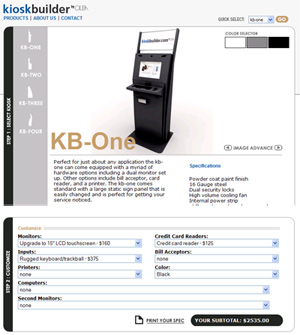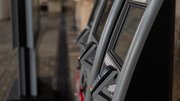Article
Standardization of models, one-stop-shopping emerge as growth strategies
Self-service deployments usually involve custom design of some sort, but the companies building them are increasingly looking to standardize as much of their product line as possible. Is a true "off-the-shelf" kiosk coming soon?
December 11, 2005 by James Bickers — Editor, Networld Alliance
Imagine yourself buying a new microwave oven. You know you need it in white, in order to match your kitchen. Your options are limited, then, to the array of white microwaves offered by your retailer or Web site of choice. If you don't like the numeric keypad on the front of the white ones, you're out of luck.
Now consider the automobile, itself a product that is mostly "off-the-shelf"; Henry Ford's great contribution to industry, after all, was the notion of repetitive assembly, of each unit rolling off the line looking just like the one before it. When it comes time to choose details, you do get some options - AM/FM with cassette, or CD player? Or would you like satellite radio? Buy a luxury car and you might just get to pick the numeric keypad of your dreams.
 This story and all the great free content on KioskMarketplace is supported by: Looks Cool, Runs Cooler The New Rx190 Aero Kiosk from Ezscreen |
The kiosk industry, as large and as fragmented as it is, has historically been largely a custom-design business - after all, most deployments exist to meet specific needs, and specific solutions are typically the answer. But increasingly, some self-service providers are looking to standardize their offerings as much as possible.
An evolution that's good for industry?
The self-service industry appears to be mirroring other evolving technologies, said Glen Fossella, vice president of marketing for Charlotte, N.C.-based Source Technologies.
"An industry cannot scale without standards, without uniformity in its solutions to a certain extent," he said. "Back in the early days of PC technology, there were literally dozens of operating systems that you could put on a computer. There were even several flavors of DOS, and we all know what happened there."
The same thing happened with hardware, with de facto standards emerging over time. It's hard to imagine what the business world would be like today without field-leveling standards like TCP/IP, PCI motherboards, Windows Plug and Play or any number of other innovations.
"Self-service is moving out of being a cottage industry and into being a real business, with large-scale deployments," Fossella added. "And we're going to have to apply the same approaches to scaling our industry that the PC industry did, and the cell phone industry, and any other technology industry."
Tom Weaver, president of Louisville, Colo.-based Kiosk Information Systems, said approximately 35 percent of his company's projects are custom from the ground up, with the rest relying at least in part on standard models and configurations. About 75 percent of the units KIS ships are standards. Even so, he said, virtually all jobs require at least some custom work. "We still try to standardize on components, obviously, as much as we can to maximize cost and support factors."
An off-the-shelf approach to kiosk building

One innovative attempt at making the kiosk sale as "catalog-like" as possible is Kiosk Builder, owned and operated by enclosure specialist Olea. Users select one of four basic models, pick a color, then use drop-down windows to add or remove features like card readers, printers and keyboards. The price is dynamically updated, and when the "building" is complete, a click of a mouse sends the spec to Olea for follow-up. (And a small link at the bottom of the page encourages visitors to go to the main Olea site if they find they need a greater level of customization.)
The one thing that a customer can't get from KioskBuilder's menu-based interface is software. Dave Hammer, vice president of business development with APW, thinks that's wise.
"(The customer) may very well want to install their own software, because they want these pieces of hardware to be linked together and linked to their network. So a kiosk company saying `Here's a piece of hardware, and here's the only software that works on it,' they might be missing an opportunity."
Ben Wheeler, director of marketing for APW's kiosk line I-engage, agreed. "I don't know if anyone can `sell a car' in the kiosk business. As long as you've got that GUI that's got to be customized, it's going to be a professional service."
Wheeler said I-engage is working on building "catalog-able" kiosk models that can handle most common needs, leveraging the manufacturing strength of parent company APW, which operates facilities in eight countries. Customization comes at the software stage, and it's at this point that I-engage begins dealing with partners.
"My vision for the industry is that we bring a best-of-breed solution," Wheeler said. "I want to bring together the best solutions, rather than pretend we're the know-all-be-all. After all, how much more impressive is it to put WebRaiser in front of you, than to tell you how great we are, that we'll take care of everything?"
Although I-engage is not exclusive with any software provider, Wheeler said the company recently signed a four-year contract to use WebRaiser's products and services. "We're not married to anyone, but we're courting heavily with some strategic partners," he said.
One-stop shopping?
Fossella said that Source has been driven by a desire to provide true "one-stop shopping" for self-service - everything from the hardware to the software to the engineering needed to make them work together in the real world.
"It's true that in most cases and for most vendors, one-stop shopping is not a possibility, because they provide a kiosk platform or a software platform or they engineer devices, but they don't do all three," he said. "In our case, we are doing all three of those things."
Source Technologies' standard offerings for both hardware and software are marketed under the "concourse" moniker, which includes the kiosks themselves in a variety of models, plus the software to run on them. Off-the-shelf concourse software packages include bill payment, check cashing, credit applications and branch automation.
|
Fossella said that one of the company's goals was to engineer the software in such a way that the kiosk buyer can, in many cases, design the interface on his own and make changes when necessary, "rather than always having to run back to us." The concourse Workflow Editor is a drag-and-drop application that lets non-programmers build their own GUI on top of standard libraries, add branding materials, modify workflow, then export the finished product to HTML, JavaScript or Flash.
"If I were a vendor that just did hardware or just did software, I might be able to make the argument that I could deliver more to my customer through customization," he said. "But all you've got to do is take one step back, and you're kidding yourself if you don't think that self-service kiosks are moving toward a higher level of standardization. It's going to happen - it always does."
Tools like the concourse suite and Olea's Kiosk Builder couple standardized offerings with an end-user-friendly interface that puts more power and responsibility in the hands of the kiosk buyer than ever before. The irony is hard to miss: The building and deployment process of self-service itself is on its way to becoming a self-serve process.
 ChatGPT
ChatGPT Grok
Grok Perplexity
Perplexity Claude
Claude












